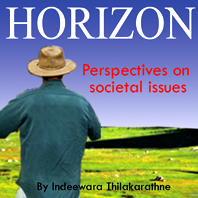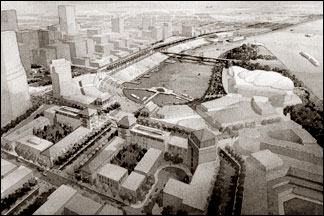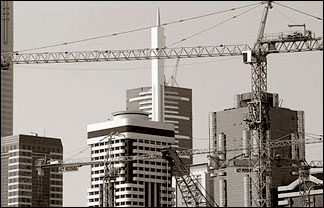Chaos and disorder in urban areas
The need for spacious planning at local level:
 In an interview with Sunday Observer, Prof. S.T. Hettige of the
Sociology Unit of the Colombo University discusses factors which may
have contributed to the chaos and disorder of planning at Urban Council
level. In an interview with Sunday Observer, Prof. S.T. Hettige of the
Sociology Unit of the Colombo University discusses factors which may
have contributed to the chaos and disorder of planning at Urban Council
level.
Sri Lanka’s population density is only second to that of Bangladesh.
This is understandable. The country’s population at the time of
independence was about 6 million, compared with about 20 million today.
In spite of rapid population growth over the last sixty years, the
vast majority of the population continued to live in rural areas
exerting pressure on the available land resources in the countryside.
Successive governments took measures to distribute uninhabited and
uncultivated land among the landless, while at the same time turning a
blind eye to widespread encroachments on public land.
 The resultant decline in the forest cover, besides other
consequences, has driven wild animals into areas inhabited by people. The resultant decline in the forest cover, besides other
consequences, has driven wild animals into areas inhabited by people.
Today, we frequently hear stories of village families being attacked
by wild elephants that roam around in the villages. Lesser creatures
like monkeys and wild boar also do their rounds in the villages
destroying crops.
In urban industrial societies where the vast majority of people live
in large cities and work in manufacturing and service industries, rural
hinterland remains sparsely populated.
While small family farms have mostly given way to larger commercial
farms there, reforestation of large areas has also occurred side by side
leading to restoration of natural forest.
This is what we observe in many developed countries in other parts of
the world. The countryside in many of these countries has become a site
for recreation activities such as camping, mountain climbing and
gathering forest produce.
People who have migrated to cities in the developed countries are
gainfully employed in industries and services. Their relatively high
incomes have enabled them to find decent accommodation with modern
amenities.
Systematic urban planning has created a livable urban environment
characterized by proper environmental sanitation, open public spaces,
efficient public transport, reliable utility services and effective
maintenance of the public order.
Careful land use planning has been a critical aspect of all of the
above. Such systematic urban physical planning has been possible due to
certain preconditions created by the state in these countries.
 These preconditions can be enumerated as enactment of enabling and
supportive legislation, Development of institutions to give effect to
such legislation, These preconditions can be enumerated as enactment of enabling and
supportive legislation, Development of institutions to give effect to
such legislation,
Development and empowerment of key professions in the relevant
fields, enforcement of legislative provisions without any undue
interference by political and other vested interests.
As is well known, some of these basic conditions do not exist in Sri
Lanka.
Though we have enacted legislation to regulate land use practices,
they are often observed in the breach. Many institutions have been
established and maintained at public expense but their effective
functioning is severely hampered by undue external interference.
This becomes clearly evident when one looks at what has happened to
reservations along railway lines, highways, rivers, beaches and canals.
In urban areas, encroachment of reservations and public spaces is
endemic and has led to serious health, environmental and safety issues.
The most appropriate authority to regulate land use practices at the
local level is the elected local council. Yet, most of these councils do
not have the capacity to do so. This is partly due to their steady
marginalization over time by the central government politicians and
supra-national bodies.
The latter often override the authority of local councils.
Local-level elected representatives can hardly resist external
interventions even when such interventions are detrimental to the
well-being of local communities.
Ideally, the local councils should be empowered to manage and develop
local resources according to a systematic plan. They should have the
necessary resources and professional expertise to undertake surveys and
develop data bases and zonal maps needed for planning purposes.
Yet, this is hardly feasible in most local council jurisdictions.
Local authorities often cannot keep track of population movements,
business activities and property development in their own areas. Rapidly
increasing population density and haphazard development of business
activities in urban areas clearly attest to this fact.
Sound land use planning at the local level is either facilitated or
hindered by national policies in such sectors as housing, road
development and transport.
While local authorities have little to do with what happens in these
sectors, it is often supra-national bodies responsible for these sectors
that have the greatest influence even at the local level.
Even in the most congested urban areas, there is little or no attempt
being made to optimize land use for housing development. Private land
developers sub-divide large blocks of land into minute parcels and sell
them to individuals to build single story houses.
The state has done the same in many urban areas. The end result is
the lack of any public space for community uses such as parks, gardens,
plays grounds, etc. Haphazard filling of marshy land has blocked
waterways leading to serious health and environmental problems.
When one travels through congested urban centres in all parts of the
country, one realizes that local authorities have had little or no
control over the development and management of these centers.
In fact, what one often observes is chaos or disorder. While it is
obvious that the central government authorities cannot do much to sort
things out, local authorities seem to be even more helpless.
How can we change the above situation? There is certainly no simple
answer to this question. What is critically important is to build
consensus on the need to make rational use of land resources available
in a given area, particularly in densely populated urban areas.
Once various stakeholders such a political leaders, professionals,
public servants, the private sector and the general public reach such
consensus, it is easier to figure out what steps need to be taken to set
in motion a process of rationalization.
As mentioned before, the most appropriate unit for land use planning
is the local authority area. If each of the local councils can be
empowered to undertake this responsibility, many of the issues connected
with resource use that we observe today could be effectively addressed.
In this regard, the development of professional expertise in the
relevant fields at the local council level is crucial. Other
pre-conditions for success are mobilization of adequate resources,
guarantee of local autonomy, public participation in the planning
process and good governance at the local level.
It should however be emphasized that none of these things is likely
to materialize unless a conscious effort is made by the authorities to
initiate some concrete action on the above lines. On the other hand,
authorities are unlikely to initiate action unless they realize that
there is a public demand for change. |
